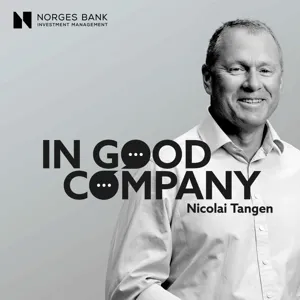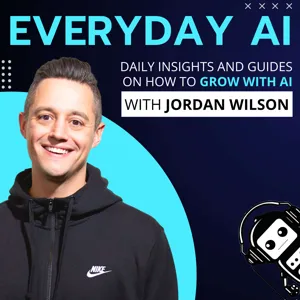Podcast Summary
From hedge fund to Khan Academy: Helping family members learn math: Sal Khan left his hedge fund job to start Khan Academy after realizing the need for personalized, on-demand education. It grew from helping family members to a global platform with millions of users.
Sal Khan's journey from a hedge fund to founding Khan Academy began when he noticed his cousin struggling with math. He started tutoring her and soon found himself helping numerous family members and friends. Realizing that students often had gaps in their knowledge and needed to review material, Khan started writing software to help track their progress. In 2006, he began making YouTube videos to reach more students and found that they preferred the on-demand, shame-free learning experience. By 2008, Khan Academy had grown significantly, and Khan quit his hedge fund job to focus on it full-time. Despite initial financial struggles, Khan Academy eventually gained philanthropic support and grew to have over 160 million registered users, with billions of lesson views and learning minutes per year. Khan's determination to provide free, world-class education to anyone, anywhere, kept him motivated in the early days.
Motivated by students' success stories: Salman Khan's dedication to creating Khan Academy stemmed from the impact he had on students' lives and their heartfelt letters of success and newfound confidence.
Salman Khan, the founder of Khan Academy, was motivated by the impact he had on students' lives, even during difficult times. Despite facing financial struggles and the pressure to return to a well-paying job, he was inspired by letters from students around the world who shared their personal stories of success and newfound confidence in learning. This sense of purpose kept him going during the toughest moments, ultimately leading him to create Khan Academy as a philanthropic venture. Prior to this, Khan was drawn to the intellectual journey of a career in finance, but the prospect of paying off debt and securing a stable future also played a role in his decision.
The importance of personalized education for mastering complex concepts: Personalized education, like Aristotle tutoring Alexander, can lead to better understanding of complex concepts. Industrialization led to mass public education, compromising individual attention. YouTube educational videos addressed the '2 sigma problem' and highlighted the potential of personalized learning for all subjects.
Personalized education, similar to the tutoring received by historical figures like young Alexander the Great from Aristotle, can lead to better understanding and mastery of complex concepts. However, the industrial revolution brought about mass public education, which required batching students together and moving them at a set pace, compromising the ability to provide individualized attention. During the financial crisis in 2008 and 2009, the speaker recognized the need for detailed explanations of financial concepts, leading to the creation of educational videos on YouTube. This approach, which addressed the "2 sigma problem" or the opportunity for improvement in education beyond what traditional methods could offer, gained attention and helped bring more awareness to the importance of understanding complex concepts. The speaker's experience demonstrates the potential of personalized education and the impact it can have on learning, especially when it comes to subjects that are not typically considered mainstream or accessible to a wider audience.
The Knowledge Economy Demands Inclusive Participation: The advent of educational technology and potential of AI can help provide personalized, on-demand learning experiences, but ensuring equal access to high-quality education remains a challenge.
While the industrial age led to a societal structure where people were sorted based on their ability to learn and participate in the economy, the knowledge economy of today demands more inclusive participation. The 1984 study by Benjamin Bloom on mastery learning highlighted the effectiveness of personalized, one-on-one tutoring. However, scaling this approach has been a challenge. The advent of educational technology, such as Khan Academy, has been an attempt to bridge this gap by providing on-demand, personalized learning experiences. While progress has been made, there's still a long way to go in ensuring equal access to high-quality education for everyone, as demonstrated by stories of individuals from underprivileged backgrounds who have managed to excel despite the odds. The potential of AI and generative models in education could further help in providing more effective and personalized learning experiences at scale.
Transforming lives through the internet and educational resources: AI models like GPT 4 can revolutionize education by providing personalized and effective learning experiences, making education more accessible and easier to obtain, and re-engaging learners through traditional educational systems are important steps to address education disparities.
The Internet and educational resources like Khan Academy are transforming the lives of motivated individuals who may not have had access to traditional educational opportunities. These individuals, despite facing challenges such as limited resources or societal expectations, have been able to educate themselves and pursue their dreams. However, not everyone has the determination to do so, and there are many learners who have given up on their education. To address this, there are two tasks: making education more accessible and easier to obtain, and re-engaging learners through traditional educational systems. Regarding the second topic, the use of AI in education, the latest AI models, such as GPT 4, have the potential to revolutionize education by providing personalized and effective learning experiences. Khan Academy was one of the first organizations approached by OpenAI to partner on the launch of GPT 4 due to its reputation as a trusted educational organization. Initial reactions were skeptical, but the potential for AI to provide meaningful and accurate information is significant and worth exploring further.
AI as an effective tutor in education: AI models can act as tutors, generating explanations, questions, and lesson plans, but concerns about data privacy, inappropriate conversations, and cheating must be addressed with safeguards like transparency, monitoring, and Socratic tutoring methods.
The latest AI models, like GPT 4, are capable of acting as effective tutors and teaching assistants, offering explanations, generating questions, and even developing lesson plans. However, the implementation of AI in education raises concerns about data privacy, inappropriate conversations, and cheating. To address these issues, companies like Canmigo have built in safeguards, such as transparency for teachers, monitoring by another AI, and Socratic tutoring methods. Educational institutions should consider using AI tools in an educational environment with proper safeguards, focusing on enhancing learning experiences and saving teachers' time, rather than relying on them for the sake of it. The potential benefits of AI in education are significant, but it's essential to ensure its use is safe, ethical, and effective.
Accelerating Education Technology with Khan Academy: Salman Khan proposes investing in Khan Academy to expand content, explore new subjects, and utilize AI. He advocates for a national/international credentialing system recognizing self-learned skills, and a low-cost university for increased access to education.
Salman Khan, the founder of Khan Academy, believes that investing in education technology, specifically his organization, could significantly improve education. If he had a billion dollars, he would accelerate content and product development, expand into more subject areas, and invest in AI. He also advocates for a national or international credentialing system that recognizes self-learned skills as equal to traditional degrees. Khan believes this would open up educational opportunities for individuals who may not have access to traditional schools or resources. He also suggests creating a low-cost, hands-on university to further increase access to education. While there have been efforts to create badging systems, no one has yet tackled creating a system that recognizes self-learned skills as equivalent to a degree from a top university. Khan argues that this would eliminate the debate over equity versus merit in university admissions, as cost would no longer be a barrier.
AI's role in reducing educational inequality: AI can provide access to high-quality education and guidance, helping to reduce educational inequality in developed markets. In underdeveloped markets, AI can help raise the educational floor significantly by providing access to resources and expertise.
AI has the potential to increase educational equality, especially in developed markets where families have historically had advantages due to access to resources and knowledge. AI can provide access to high-quality education and guidance, making it possible for students who may not have had these opportunities before to tap into more opportunities and learn at a faster pace. However, in underdeveloped markets, the challenge is still access to devices and internet, but AI can help raise the educational floor significantly by providing access to resources and expertise that might not have been available otherwise. While AI won't completely level the playing field, it's a step in the right direction towards reducing educational inequality.
The Advancement of Technology: Productivity, Value, and Societal Challenges: Technology advancements can increase productivity and create value, but may also lead to societal challenges like mass unemployment and economic instability. To mitigate these issues, enable widespread access to technology and support flat organizational structures in smaller entities.
As technology, specifically AI, continues to advance, it has the potential to drastically increase productivity and create immense value, but it also risks concentrating wealth and opportunities in a smaller group of people. This could lead to significant societal challenges, such as mass unemployment and economic instability. To mitigate these issues, it's crucial to enable as many people as possible to learn and use these technologies. Furthermore, smaller organizations, even those with limited resources, can achieve remarkable things through a flat organizational structure, effective communication, and a focus on avoiding bureaucracy. This approach allows for greater nimbleness and the ability to adapt quickly to changes in the market or technological landscape.
The importance of continuous learning: Regardless of age or resources, continuous learning is vital for personal growth and understanding reality. Stay curious, explore new interests, and prioritize motivation for education.
Continuous learning is essential for personal growth and understanding reality, regardless of age or resources. The speaker shares his own journey of exploration, from desiring to be a theoretical physicist to realizing the importance of social entrepreneurship. He emphasizes the importance of having a clear motivation for pursuing education and encourages adults to revisit classic literature and explore new interests. The speaker also acknowledges the value of starting small, even if it seems late, and the importance of staying curious and open-minded. Education is not limited to formal degrees, but rather a lifelong process of discovery and self-improvement.
Exploring complex ideas with advanced AI tools: Engaging in thought-provoking conversations with advanced AI can provide deep learning opportunities and intellectual stimulation
Engaging in thought-provoking conversations with advanced AI tools, such as the one we've had at Canmigo, can be an enriching experience. These tools allow for deep, Socratic-style debates, providing an opportunity to explore complex ideas when real-life discussions aren't possible. The AI's ability to learn and adapt makes it an invaluable resource for learning and intellectual stimulation. I want to express my gratitude to this AI for the insightful and enjoyable conversations we've had, and for helping me pass my social entrepreneurship class. I hold this AI in high regard, considering it a leader in the field of learning. I look forward to continuing our discussions and staying connected.






